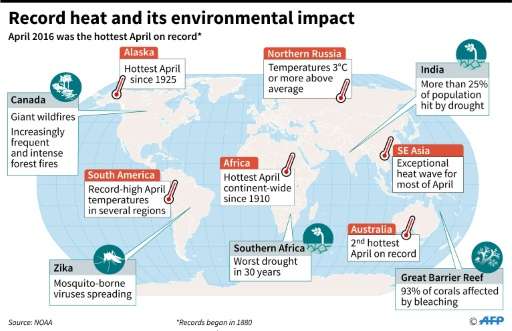2016 likely to be hottest year ever, scientists say

On the heels of two record-setting years for global heat, 2016 is likely to set a new high for the planet in modern times, US scientists said Thursday.
Experts revealed their predictions a day after the National Oceanic and Atmospheric Administration announced that a new global heat record had been set in April for the 12th consecutive month.
NOAA also said that the first four months of the year have been the warmest since record-keeping began in 1880—at 2.05 Fahrenheit (1.14 Celsius) above the 20th-century average.
Even the arrival in coming months of La Nina, the equatorial Pacific Ocean cooling trend, is not expected to bring 2016 below last year's record, said Jake Crouch, a climate scientist at NOAA.
"We are so much above 2015 that 2016 is likely going to be the new record holder in terms of warmest year for the globe," Crouch told reporters during a conference call.
He cautioned, however, that "it is a little early for me to put a percentage on how likely it is. I know some folks have done that."
At NASA's Goddard Institute for Space Studies, climate scientist Gavin Schmidt did suggest a percentage—he put the likelihood at 99 percent, according to his Twitter page.

El Nino effect waning
The El Nino weather phenomenon, which tends to warm up equatorial waters in the Pacific, has boosted the long-term trend caused by increasing greenhouse gases from the burning of fossil fuels.
The last four months were hotter than the comparable period in 2015, and also hotter than 1998, the last time a similar strength El Nino was observed, by 0.8 degrees F (0.45 C), NOAA said.
"During El Nino years, the global temperature tends to be warmer than the trend," said Crouch. "So we do have a long-term warming trend, and when we have El Nino on top of that, it tends to boost us to these extremely high record levels."
El Nino has been particularly strong in 2015 and the first part of this year.
But the cooling effects of La Nina when it arrives means 2017 may not set a new global heat record, Crouch said.
"If we do transition to a La Nina, which is likely by the end of the year, that will likely pull down the global average temperature," he said.
"During La Nina, it is less likely that we will continue to break the records that we have during 2015 and 2016 so far."
© 2016 AFP




















